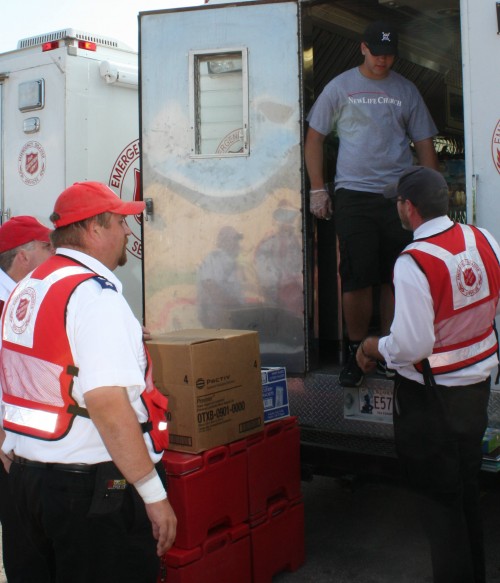Salvation Army Provides Spiritual and Emotional Support to OK Tornado Survivors
Lindsay Sparks | lindsay_sparks@uss.salvationarmy.org | (403) 613-9698

Moore, OK (May 30, 2013) - On Monday May 20, Salvation Army minister Sergeant Rob Daniels, at left of photo in orange cap, was serving in Shawnee, Okla. following the tornado that hit that area the day before. His team was offering services to those affected when he heard on the radio that a large tornado was on the ground, headed toward the adjacent city of Moore, Okla. While his team took shelter in the basement of City Hall, stories started flooding in over the radio about the devastation in Moore: The hospital was gone, children were stuck in a school, and hundreds were without homes.
New disaster response orders rolled in from Emergency Disaster Services Director Steven Hartsook, “As soon as it is safe, we need you in Moore.” Within the hour Sgt. Daniels and his team were racing to the hardest hit areas. As they approached the city via I-35, Sgt. Daniels was struck by the amount of dirt and debris--at least three inches thick--covering the highway. Seeing the remnants of what had been the Warren Theatre brought back memories of his previous disaster service after the 1995 bombing of the Alfred P. Murrah Federal Building in downtown Oklahoma City. “Everywhere I looked that day,” he said, “there were injured people seeking medical attention, begging for someone to help them. Medical personnel were scrambling to help as many people as possible.”
When he reached the emergency response command post at Plaza Towers Elementary, he saw many who were not hurting physically, but emotionally. Parents were pacing or lying on the ground, lost in a fog of emotions--wondering where their little ones were. “My mind raced back to the evening in 1995 when a firefighter, with tears in his eyes, told me they had finally reached the daycare,” he recalled. “I wondered if this night would end in the same way, with a brave firefighter crying on my shoulder for the children that were lost.”
Eventually Sgt. Daniels found himself among the first responders who had recovered the children lost from the rubble. They didn’t want a lot of people in the area; these brave men and women needed to process what had happened, but they also asked that one person stay with them. Sgt. Daniels stayed, offering to listen if they needed to talk. He was there with them until the medical examiner and mortician arrived. “My heart broke,” he said, “as I saw these men and women who have committed their lives to saving others watch the vans leave with those that they could not save.”
Sgt. Daniels has stayed in Moore since the tornado. He continues to care for those who are struggling, hurt, and emotionally drained from losses of homes, transportation, loved ones, and security.
Salvation Army officers are trained in emotional and spiritual care. They may not be able to heal a broken bone, but they step in when they can to help heal a broken heart; they do it with hot meals, cold water, a hug, and a prayer because they know that these small actions can be more powerful than they seem.
Serving in Moore over the last week, Sgt. Daniels has traveled through the same neighborhoods over and over. The daily improvements aren’t drastic; they are slow and steady. The roads clear one day, as a few destroyed cars have been hauled off. The most common sight is homeowners sorting and cleaning, throwing out the obvious trash and keeping the items that might be salvageable--or are just too precious to let go. Salvation Army mobile kitchen units, like what Sgt. Daniels uses, drive up and down the streets, offering support—food, comfort, prayer, whatever is needed.
Sometimes the impact of The Salvation Army isn’t seen but felt. One woman in her early 50s sat on her porch every day waiting on Sgt. Daniels and his canteen. Day after day she would only take a bottle of water or Gatorade and a bit of food . And she was always alone. Her home was standing, but there was damage all around her and large holes in her roof. When Sgt. Daniels asked if she needed anything--gloves, masks, or sunscreen--she said she was fine, but wanted to thank him for coming by to check on her. “She told me that as much as she appreciated the cold drinks and food,” he said, “we gave her something much more important; comfort and stability.”
"’I know that you will come by here at least twice every day, and whenever you come by, you will ask me how I am doing and how you can help,’ she told me. ‘While the rest of my world is turned upside down, I know The Salvation Army will always be right on time when I need you most.”
At the end of their daily conversation Sgt. Daniels prays with her, hugs her neck, and continues making his way through the ruined neighborhood.
The Salvation Army annually helps more than 30 million Americans overcome poverty, addiction, and economic hardships through a range of social services. By providing food for the hungry, emergency relief for disaster survivors, rehabilitation for those suffering from drug and alcohol abuse, and clothing and shelter for people in need, The Salvation Army is doing the most good at 7,600 centers of operation around the country. In the first-ever listing of “America’s Favorite Charities” by The Chronicle of Philanthropy, The Salvation Army ranked as the country’s largest privately funded, direct-service nonprofit. For more information, visit www.SalvationArmyUSA.org. Follow us on Twitter @SalvationArmyUS and #DoingTheMostGood.